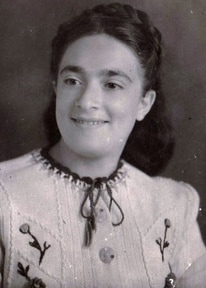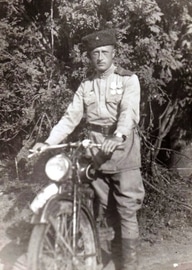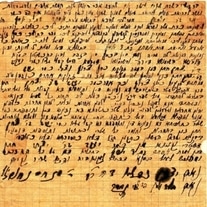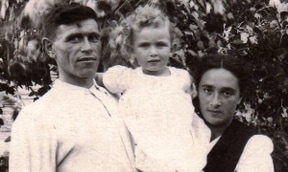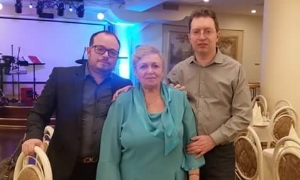After a Pesach seder, father took little Esterka outside and pointed to the sky. “Elinuve[1] is up there,” he said. “Why don’t I see him,” Esterka asked. “That’s because you go to school on shabbos.” Esterka did go to school on Saturdays, but wasn’t taking notes under different pretexts. Her childhood, despite her being born in the Communist Ukraine in 1922, was enveloped in the Jewish atmosphere. In the shtetl of Krasnostav, which is located near Slavuta in the Khmelnitsky region of Ukraine, there was a synagogue where her father Yosef Reznik was a cantor. As evidenced by his last name[2] , he also came from a dynasty of shochtim; he was a mohel as well.
When father wasn’t home, and mother had some doubt as to the kashrus of a chicken, she sent Esterka to the local rabbi “Gey tsu rebe. Freyg a shayle ,”[3] she said. Esterka also liked to run to the local pharmacist, who had to write an address in some strange characters on the envelope that she brought. “M.Meshorer…HaCongress St… Tel Aviv…Palestine,” Esterka repeated, inadvertently remembering the words. Her grandfather, a Karliner chasid Rav Isroel Zinger (Meshorer), who left neighboring Poland in 1925, was living in Tel Aviv and working on some Kabbalistic writings which were subsequently published. His wife and four children lived with him, three older children lived in America, and only Khava and her seven children were remaining in Ukraine. She really wanted to join her parents in Palestine, and her husband Yosef and older sons even went to Moscow to apply for permission to leave from the Supreme Soviet head Mikhail Kalinin but were denied and had to return to their native Krasnostav.
While sitting at the shabbos table, Esterka was enchanted by the magic of her father’s voice singing, “Fraytik af der nach iz a yeder yid a meylech, in yeder vinkele lacht, un in shtibl iz akh take freylech”[4] . Her mother was singing “Vu bistu geven”, which was popular at the time. “Where have you been when we had money and life was sweet as sugar? Now you are here, but we have not a cent, and life is bitter as death”.
At the age of 17, Ester left her parents’ home – forever, as it turned out. She was only going to visit her brother Benyumen, who was living in the town of Ovruch in the Zhytomir region but ended up staying there to enroll in a bookkeeping course, which led to her employment at a local orphanage. Fira, as she was called outside of her home, became enamored with the art of bookkeeping, and was knocking on an abacus, reconciling debit and credit and preparing quarterly statements for the rest of her working life, with the exception of a turn her life took in June 1941 at the outset of the war. She was supposed to evacuate with the orphanage, whose administration agreed to take her brother with his wife and three
At the age of 17, Ester left her parents’ home – forever, as it turned out. She was only going to visit her brother Benyumen, who was living in the town of Ovruch in the Zhytomir region but ended up staying there to enroll in a bookkeeping course, which led to her employment at a local orphanage. Fira, as she was called outside of her home, became enamored with the art of bookkeeping, and was knocking on an abacus, reconciling debit and credit and preparing quarterly statements for the rest of her working life, with the exception of a turn her life took in June 1941 at the outset of the war. She was supposed to evacuate with the orphanage, whose administration agreed to take her brother with his wife and three
|
children along, but he wouldn’t budge. The orphanage had already left, but Fira was still trying to convince her brother to go. “Mir vil inergtz-nit furn ”[5], he kept saying. Then she picked up her meager possessions, wrapped them in a shawl, leaving her brother half of her salary. She told him she was going to see her mom, but in a matter of days ended up in the village of Usady in the Tatar Autonomous region – a world apart from her mom. Her mom, dad, brother Chaim and sister Malka as well as scores of other relatives were shot on August 29, 1941 – the day on which 785 Krasnostav Jews lost their lives. Her brother Benyumen, who didn’t want to leave Ovruch, also perished, as did her brother Ezra, who was killed on the battlefield. In fact, only three of the seven Reznik children survived the war. Aside from Fira, her older brothers Yochanan (Yasha) and Bentsion (Borya) came home from the front.But back then Fira couldn’t know any of that and got down to work as a secretary of the village council.
The arrival of a young Jewish girl from Ukraine left a deep impression with the village folk. |
“I thought them Jews have horns,” said the council clerk Shurka Nikiforov, as he recorded the evacuee’s name. Fira was not to remain the only Jew in town for long; she soon made friends with the Pintel family that arrived from a village near Odessa. The locals’ initial apprehension gave way to the earned respect, when, in 1943, Fira was promoted to a position of the head of the village council, thus taking charge of hundreds of villagers. She was only 20. One evening, she suddenly heard some Yiddish spoken beside her windows. She opened a window and saw two soldiers wearing strange uniform. These were the soldiers of General Anders’ Polish Army Brigade that was being formed in the Soviet Union at the time.
They heard that there was a Jewish girl in the village and hurried to meet her. “We want to marry you”, they said. “Both of you?” Fira inquired. The soldiers told her that after the war they were planning to go to Palestine and wanted her to come along.
|
She would have neither of them, though, and upon learning of her parents’ fate went to Odessa with the Pintels, since she could no longer go back home. Her brother Yasha, whose army address she managed to obtain, promised to pick her up when he is released from the army.
In Odessa she met the Pintels’ elder son Yakov, who miraculously survived a life-threatening lung wound he suffered while in the punishment battalion, where he was sent after being released from a POW camp[6] . Yakov, who took on the name Vasili Kravchenko in captivity, survived four POW camps, which greatly dismayed a SMERSH[7] debriefing officer. “So you are a kike, and you are alive!” he exclaimed. Yakov couldn’t bear the insult and hurled an inkpot at his offender. The officer reached for his gun, and Yakov faced yet another brush with death only to be saved by a commanding officer that stepped into the interrogation room overhearing the commotion. |
When Fira’s brother came to take her home to Slavuta with him, Yakov volunteered to go as well. “Ver is der goy? ”[8], asked one local when Yakov appeared at his doorstep. On the 12th of Adar Rishon 5706, according to the ketubah that Fira had safeguarded all these years, Yakov and Fira
|
got married. The words “Harey et mekudeshet li”[9] that Yakov memorized while standing under the huppa stayed with him throughout the 55 years of their marriage.
A move back to Odessa region, the birth of daughter Yeva, building a house in Odessa, the birth of grandsons Lenya and Igor, the emigration to the U.S. were all to follow. Through all these milestones, |
Fira had kept the memories of her childhood alive and tried to pass them on to her daughter and grandsons. How happy she was when her grandson Lenya was making halting attempts to read in Yiddish from Sholem-Aleichem’s Adventures of Motl and later read more comfortably from the
|
Yiddish Forwards that she subscribed to in America. How her eyes welled up with tears when she heard the words of “Echad Mi Yodea” at a Passover seder conducted by her grandkids. Her Jewishness had nothing to do with ideology. She knew little of movements within Judaism. She just tenderly preserved whatever she brought from home.
Her heart stopped beating on June 14, 2012; memories, photographs, notes are all we are left with now. One of such note, on which Fira’s firm handwriting can still be seen, featured a poem imparting some words of wisdom to us. |
“Do not live in sadness. Do not regret what came to pass. Do not think of what is yet to come. Just treasure what you have now.”
|
|
Leon Geyer conducted video interview with his grandma Fira (Ester) Pintel (nee Reznik) in November 27, 2010.
Fira was born in Krasnostav, Ukraine on December 31, 1922 and died in Brooklyn, USA on June 14, 2012 |
[1] Eliyahu-Hanavi ,Elijah the Prophet, who is believed to appear on Passover night to herald the arrival of Messiah.
[2] Reznik means “animal slaughterer” in Russian and Ukrainian
[3] Go to the rebe and ask a question (Yid)
[4] On Friday night, when every Jew is a king, there is laugher in every nook and a lot of happiness in the house (Yid)
[5] We won’t go anywhere (Yid)
[6] According to Stalin’s orders, the released POWs had to “cleanse their crime with blood”. They were stripped of their military ranks and sent to the most dangerous sectors of the front. Their ranks were restored, and they were transferred to a regular army unit only after they suffered combat injury.
[7] The counter-intelligence arm of the Soviet security forces entrusted with detecting enemy infiltrators in the Red Army
[8] Who is this non-Jew? (Yid)
[9] You are consecrated to me (Heb)
[2] Reznik means “animal slaughterer” in Russian and Ukrainian
[3] Go to the rebe and ask a question (Yid)
[4] On Friday night, when every Jew is a king, there is laugher in every nook and a lot of happiness in the house (Yid)
[5] We won’t go anywhere (Yid)
[6] According to Stalin’s orders, the released POWs had to “cleanse their crime with blood”. They were stripped of their military ranks and sent to the most dangerous sectors of the front. Their ranks were restored, and they were transferred to a regular army unit only after they suffered combat injury.
[7] The counter-intelligence arm of the Soviet security forces entrusted with detecting enemy infiltrators in the Red Army
[8] Who is this non-Jew? (Yid)
[9] You are consecrated to me (Heb)


